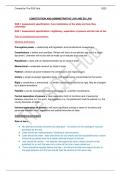Summary
Summary SQE 1 Constitutional and Administrative Law and EU Law
Introducing Constitutional and Administrative Law and EU Law notes from The SQE Hub specifically tailored by addressing each of the assessment specifications listed on the SRA website. These high yield notes are an amazing revision aid and address the following: - Core institutions of the state a...
[Show more]



